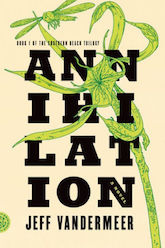As a life-long introvert, I grew up surrounded by extroverts and had to adapt accordingly. I knew what to do to get them to leave me alone; I knew how to feign excitement at social events that I found stultifying. I knew how to ignore ignorant comments from certain extroverts. For example, at the time of writing this, someone wrote on my timeline that introverts just lack social skills, which requires no response except a big-ass Gary Coleman side-eye.
Annihilation by Jeff VanderMeer is about introversion at its core. Allow me to explain in this spoiler-filled three minutes which are probably better spent buying the book. My reading is coloured by my work as a hospital psychiatrist, dealing with people who have attempted or are at risk of suicide. Passing fiction through a psychological prism is, for me, involuntary.
With the bona fides out of the way, let’s speak to the introversion of the unnamed narrator, the biologist, whom we’ll call B.
 Annihilation is the account of an expedition into Area X, the site of an ecological event at some unspecified date in the future. An organisation known as Southern Reach has sent several teams into Area X, with no success in finding out what happened. B is in the twelfth expedition, along with three other characters, also identified by profession: psychologist, surveyor and anthropologist.
Annihilation is the account of an expedition into Area X, the site of an ecological event at some unspecified date in the future. An organisation known as Southern Reach has sent several teams into Area X, with no success in finding out what happened. B is in the twelfth expedition, along with three other characters, also identified by profession: psychologist, surveyor and anthropologist.
All previous expeditions have been lost. Sometimes, a few team members have found their way out of Area X, but have seemed changed, and die soon after arrival. B’s husband, a medic and extrovert, was in the eleventh expedition.
Each member is supplied with a journal to record their findings, and Annihilation is B’s journal. B tells us a number of times that she is an unreliable narrator, however we soon realise that B’s journal is the most complete and unambiguous of all the records. That said, the whole book is full of layers of lies and half-truths, from the mouth of the leader, the psychologist, to the instructions, information and equipment supplied by Southern Reach, to the terrain itself. In Area X you cannot trust the evidence of your own senses, even something as mundane as a tunnel lined with stone. When you see a boar with electricity crackling about its eyes, or dolphins with eyes that seem human, are they really there, or is this all in your head? This literary quicksand makes the reader experience the same sense of dislocation and mounting horror that the expedition does.
We learn that B was an only child, had inattentive parents, with an alcohol-dependent mother and a con man father, she had no friends either as a child or in adulthood, and that her parents were concerned about her introversion (p45). Adult B hates small-talk, is able to fade into the background, and is aware that her husband found her distant. Their opposite temperaments served as an attraction to start with, but later led to arguments which culminated in her husband volunteering to go to Area X.
Our relationship had been thready for a while, in part because he was gregarious and I preferred solitude. This had once been a source of strength in our relationship, but no longer. (p77)
For context, Carl Jung, pioneer analyst, anthropologist, writer, artist, this-that-and-the-other, popularised the concept of introversion/extroversion, although Hans Eysenck, did some influential work. The introversion-extroversion factor has to do with the degree to which we are oriented inwards to the self or outwards to the world. Extroversion corresponds to sociability and assertiveness, while introverts tend to be quiet, cautious and prone to solitude. Many personality inventories will measure this orientation to some degree. For example, in the Myers-Biggs, the I and E factors.
It’s currently believed that introverts have higher baseline cortical activation than extroverts, leading to the latter needing more stimulation from the external world, and the former being, well, content to imagine and observe. Introversion is not a lack of social skills, and extroversion isn’t an abundance of social skills.
The way Annihilation unfolds sets B’s introversion against her husband’s extroversion. As we read her journal, we get the impression that B’s qualities, especially her introversion and tendency to merge into the surroundings, are crucial in her survival of Area X. B believes this, or at least leads us to believe that she believes this until the very end.
My sole gift or talent, I believe now, was that places could impress themselves upon me, and I could become part of them with ease. (p110).
When B discovers her husband’s journal, she finds it addressed to her, and is dismayed to realise that her husband had an interior life. She feels their relationship might have been better if she had made an effort to meet him half way.
My husband had an inner life that went beyond his gregarious exterior, and if I had known enough to let him inside my guard, I might have understood this fact. (p167)
B joined the twelfth expedition precisely because her husband was lost in the eleventh. He appeared to find his way home, but he was changed, then he died of cancer. This motivated her to volunteer and find out what he experienced.
I’d posit a different explanation, though: I think B had a suicidal impulse. Two specific facts speak to this. Before volunteering, B knew that nobody survived Area X incursions. It’s like the Hotel California from the Eagles’ song. Either they did not make it back, or they made it back altered, and died soon after. Her volunteering may have been at least subconsciously suicidal, especially seeing as it happened soon after her husband’s demise.
The second source of suicidal impulses was the psychologist. All expedition members were hypnotised prior to crossing the border into Area X. They were implanted with post-hypnotic suggestions. At one crisis point in the novel the psychologist yells ‘annihilation!’ three times at B. The word ‘Annihilation’ is supposed to induce suicide (p135).
Later in the book, B has an opportunity to leave Area X and she does not take it. Instead, she follows her husband’s path deeper and deeper into Area X. One could argue that the reason the book is called Annihilation is because it is the suicide letter of the narrator, the biologist. Plus, there’s some research that suggests that introversion in a depressed person is a higher risk for suicide.
Or maybe this is one of those to-a-hammer-everything-seems-like-a-nail situations, since I deal with suicide every day at work.
Susan Cain’s excellent book Quiet [2013] works through the evidence to find that there is no real advantage of one orientation over the other. Annihilation shows that in Area X, as in life, extroversion or introversion changes nothing. It is both the extroversion of B’s husband and her own introversion that led them into the deeper places of Area X in the eleventh and twelfth expeditions respectively. Both end up in the same position, i.e. lost.
Talking about fantastical fiction, Sir Walter Scott said a writer should give the fantastic an indirect importance to the reader by the ability to “describe with nature, and with truth, the effects which they are calculated to produce upon his dramatis personae.” Annihilation succeeds in this.
Author’s Note: Please note that this represents a thought experiment and not a definitive interpretation or literary critique of the text. There are many other ways of looking at the book and the choices that a character might make. This is just one of them, generated by my own interest and professional experience, nothing more.
 Tade Thompson is a consultant psychiatrist and writer. His most recent novel is Rosewater from Apex Books, and his novella Gnaw is available from Solaris Books. Tade’s novella The Murders of Molly Southbourne is available now from Tor.com Publishing. He lives and works in England.
Tade Thompson is a consultant psychiatrist and writer. His most recent novel is Rosewater from Apex Books, and his novella Gnaw is available from Solaris Books. Tade’s novella The Murders of Molly Southbourne is available now from Tor.com Publishing. He lives and works in England.










